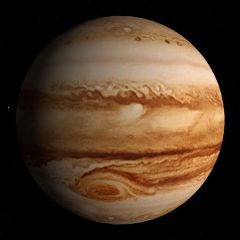Difference between revisions of "Jupiter"
Jump to navigation
Jump to search
(Updated content.) |
(Added moons.) |
||
| Line 12: | Line 12: | ||
|width="30%"|Reference body||align="right" width="30%"|Sun | |width="30%"|Reference body||align="right" width="30%"|Sun | ||
|- | |- | ||
| − | |width="30%"|Number of satellites||align="right" width="30%"| | + | |width="30%"|Number of satellites||align="right" width="30%"|95 |
|- | |- | ||
!bgcolor="lightsteelblue" colspan="2"|Planetary mean orbits | !bgcolor="lightsteelblue" colspan="2"|Planetary mean orbits | ||
Revision as of 03:09, 10 July 2024
Jupiter is the 5th planet from the Sun. It is the largest of the planets. As of June 2024, Jupiter has 95 known natural satellites, a number of which are available in the Outer Planets Add-on available on the Orbiter-Forum Resources website here.
See also:
Jupiter at Wikipedia.
Go to Addons for Jupiter
Natural satellites
| edit The Solar System | |
|---|---|
| Central star |
Sun (Sol) |
| Planets |
Mercury - Venus - Earth - Mars - Jupiter - Saturn - Uranus - Neptune |
| Natural satellites |
Moon - Phobos - Deimos - Io - Europa - Ganymede - Titan - more... |
| Add-ons |
Planets - Dwarf Planets - Small objects - Natural satellites - Alternative star systems |
 | This article, about a planet, is a stub. You can help Orbiterwiki by expanding it. |
